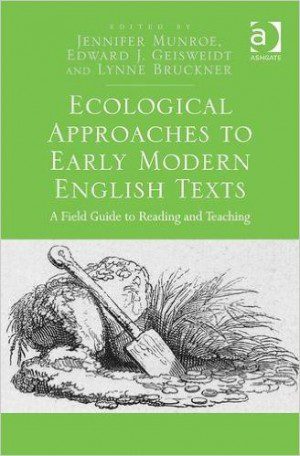New Work Unites Sustainability Issues, Early Modern Literature

In a work that unites early modern literature and sustainability issues, UNC Charlotte researcher Jennifer Munroe has released a new co-edited collection of essays, Ecological Approaches to Early Modern Texts: A Field Guide to Reading and Teaching.
“Ecocriticism has steadily gained footing within the larger arena of early modern scholarship, and with the publication of well over a dozen monographs, essay collections, and special journal issues, literary studies looks increasingly ‘green’; yet the field lacks a straightforward, easy-to-use guide to do with reading and teaching early modern texts ecocritically,” a summary of the book states.
The chapters in this field guide were written with students, scholars, and teachers in mind, to act as a guide to this approach of study. Its three sections on theory, readings, and pedagogy offer practical ways to think about how early modern English texts speak to current ecological concerns.
The volume includes research of current trends in ecocriticism and engages the reader about complex issues that arise when studying early modern texts from a “green” perspective, especially in reference to the relationship between humans and nonhumans, and between humans and landscapes. It brings ecocriticism into conversation with a variety of fields and approaches, including queer theory, feminism, post-colonial and food studies.
“Moving from Shakespeare and Milton to logging and perfume distillation, the contributors to this collection valuably trace the lines of the association that connect early modern English literary and cultural activity to our current global ecological condition,” Bruce Boehrer of Florida State University said in a review.
“The result is a stimulating and readable anthology of early modern ecostudies, offering valuable resources for teaching and future scholarship alike.” Boehrer said.
As a faculty member in the Department of English, Munroe’s research focuses on the intersection of ecological and feminist theory in literature. She has written or co-edited four previous books, including Ecofeminist Approaches to Early Modernity.
Her two current book projects explore these topics as they relate to the history of science and Shakespeare. She is the co-author of Shakespeare and Ecofeminist Theory, forthcoming in 2016 with Arden — one of the top publishers in Shakespeare scholarship.
She also is co-author of Mothers of Science: Women, Nature, and Writing in Early Modern English Literature, an ecofeminist literary history of science. Mothers of Science examines how the relationship between women and nature in 17th-century England made possible women’s marginalization from developing scientific discourse, while at the same time, women used this connection to empower themselves in knowledge-making practices.
Munroe has written articles on examining the role of ecology in Shakespeare and on ecofeminist subjects and has presented over a dozen academic papers and essays. She also is an adjunct faculty member with the Women’s and Gender Studies program and is a founding member of Shakespeare in Action: Center for the Study of Performance and Culture.
The book is co-edited by Munroe, Edward J. Geisweidt, and Lynne Bruckner and is available in hardback, paperback, and ebook from Ashgate.
Words: Skye Allan, CLAS Student Communications Assistant